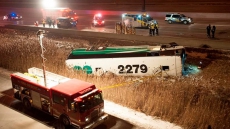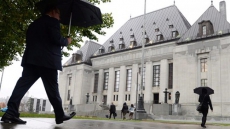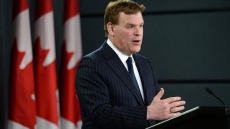OTTAWA — The Supreme Court of Canada gave rank-and-file RCMP members a major morale boost Friday when it affirmed their right to engage in meaningful collective bargaining.
The high court did not explicitly state that the Mounties have the right to form a union, but the justices effectively cleared a path to that possibility.
The landmark 6-1 ruling gives the federal government a year to create a new labour relations scheme, setting the stage for talks among RCMP members, Commissioner Bob Paulson and the Harper government.
The Supreme Court overturned a previous ruling of its own from the 1990s which upheld an exclusion that barred the Mounties from forming unions like federal public servants, who gained the right to collective bargaining in the late 1960s.
The high court says that overturning its precedent "is not a step to be lightly taken," but in this case it was justified because case law has evolved since it ruled in 1999, when it was dealing with a narrower issue.
Friday's decision was written by Chief Justice Beverley McLachlin and Justice Louis LeBel and will ultimately affect officers across the country.
The case is a major win for RCMP members, some of whom were seen hugging in the foyer of the Supreme Court building after the ruling was released.
"Today is an awesome day for all members in the RCMP," said Ray Banwarie, president of the Mounted Police Professional Association of Canada. "It is also a great day for Canada — it's a great day for democracy in this country."
Banwarie said RCMP members want to work together with management to address a "myriad" of issues facing the force, including resources, pay, benefits and equipment and grievances that have not been addressed for over a decade.
One major issue is a class-action lawsuit against the force, alleging years of harassment and discrimination, in which some 300 serving and retired female RCMP officers and civilian employees are taking part. The suit has yet to be certified by a court.
Such points of conflict could be more easily resolved if the interests of RCMP members were properly represented, Banwarie said.
In recent years, the national police force has been beset by internal complaints of harassment and bullying. A new law has streamlined the process, giving supervisors more power to deal with disputes promptly, but some critics fear that will lead to abuses.
Laura Young, the lead lawyer for the appellants, said the ruling opens the door for the RCMP to unionize and removes a process that was "foisted" by management on RCMP members and silenced them.
"We hope now to move ahead with a very positive process," she said.
Banwarie said RCMP members want to form a "police association," not a union.
Jason Tamming, a spokesman for Public Safety Minister Steven Blaney, whose department oversees the RCMP, would only say the government would study the ruling.
Treasury Board President Tony Clement would be taking the lead for the government in any future talks, he added.
The Supreme Court said excluding the Mounties from collective bargaining violates their charter right to freedom of association, but it does not dictate a specific labour relations regime that should be applied to the RCMP.
The court says the Mounties have to be sufficiently independent to have some meaningful form of collective bargaining with management.
Currently, RCMP officers have voluntary associations funded by members' dues that work with management to establish pay and benefits, but top brass maintains full control over the final result.
The ruling comes in one of two cases that the court was asked to revisit.
In the second case, the court dismissed an appeal by two RCMP officers who challenged a government decision to roll back three years of wage increases that were agreed to before the onset of 2008 global financial crisis.
The court upheld the decision by former finance minister Jim Flaherty to bring in wage-restraint legislation that reduced RCMP pay raises from 2008 to 2010.
But the main case, brought by the Mounted Police Association of Ontario and the British Columbia Mounted Police Professional Association on behalf of the entire national police force, opens the door for RCMP to unionize, and engage in collective bargaining.
The court doesn't specify what sort of labour relations model should be put in place for the Mounties.
"This court has consistently held that freedom of association does not guarantee a particular model of labour relations," the ruling said.
"What is required is not a particular model, but a regime that does not substantially interfere with meaningful collective bargaining."
The justices dismissed the argument by the federal government that preventing the RCMP from engaging in collective bargaining was warranted to prevent its members from engaging in a "an unlawful strike or other debilitating job action."





